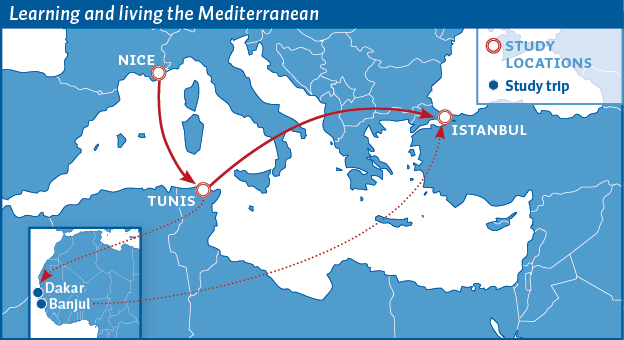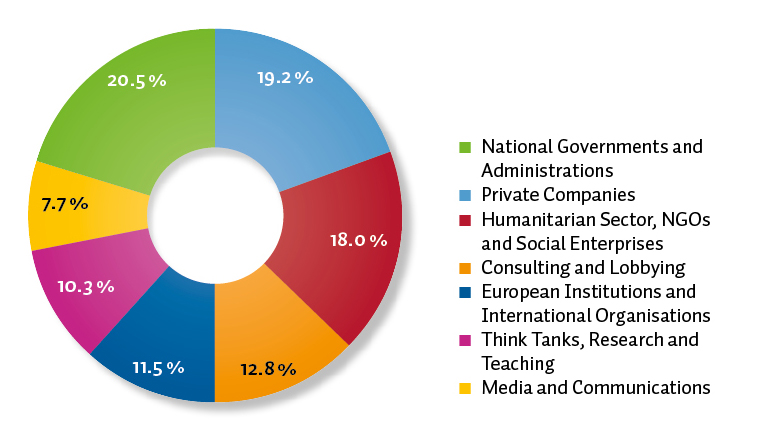|
The Master in Advanced European and International Studies (MAEIS) -
Mediterranean Studies
 Duration: 1 year (October to June) Duration: 1 year (October to June)
 Study Locations: Nice (Term 1), Tunis (Term 2), Istanbul (Term 3) + Study Trip to Dakar and Banjul Study Locations: Nice (Term 1), Tunis (Term 2), Istanbul (Term 3) + Study Trip to Dakar and Banjul
 Languages: English and French Languages: English and French
 Credits: 60 ECTS (or 90 ECTS with internship option) Credits: 60 ECTS (or 90 ECTS with internship option)
 Partners: Mahmoud El Materi University, Tunis; Istanbul Bilgi University, Istanbul; Groupe Supdeco Dakar, Dakar and Banjul Partners: Mahmoud El Materi University, Tunis; Istanbul Bilgi University, Istanbul; Groupe Supdeco Dakar, Dakar and Banjul
 Internship Option: 3 to 6 months to be completed by 31 December Internship Option: 3 to 6 months to be completed by 31 December
 Application Deadline: 30 June 2026 Application Deadline: 30 June 2026
 Tuition Fees: €9,800 Tuition Fees: €9,800
 Early Bird (€8,900): 31 January 2026 Early Bird (€8,900): 31 January 2026
Why Choose CIFE?
 Learn from academics and practitioners, including high-ranking national and EU institutional representatives. Learn from academics and practitioners, including high-ranking national and EU institutional representatives.
 Gain insights from peers representing over 30 countries. Gain insights from peers representing over 30 countries.
 Join a worldwide network of over 5,000 CIFE Alumni. Join a worldwide network of over 5,000 CIFE Alumni.
 We're one of the seven "designated institutions" supported by the European Union. We're one of the seven "designated institutions" supported by the European Union.
 95% of our graduates attest full satisfaction with the programme. 95% of our graduates attest full satisfaction with the programme.

Learning and Living the Mediterranean
Our Master in Advanced European and International Studies - Mediterranean Studies is designed for highly motivated, multilingual students who seek to become the next generation of Euro-Mediterranean decision-makers. The bilingual programme is taught in two of the working languages of the European institutions: English and French.
Graduates receive two certifications: the Master in Advanced European and International Studies - Mediterranean Studies; and the degree qualification "Policy Officer in European and International Organisations" (level 7 EQF), recognised by the French state.
Programme Structure
Our curriculum is regularly updated to reflect the current geopolitical, social and economic landscape of the Mediterranean region.
Please note that the information given below may be subject to change.
Read more about the teaching modules here.
|
|
Who Studies the Master in Mediterranean Studies?

Where Our Graduates Work

What Our Alumni Are Saying
|
Admission Requirements
We seek motivated candidates who wish to deepen their understanding of the Euro-Mediterranean region.
As an international and interdisciplinary programme, this Master is open to candidates of all nationalities and academic backgrounds.
 Bachelor's degree Bachelor's degree
 An active proficiency in English and French (minimum B2 for language 1; minimum B1/B2 for language 2). Levels should be obtained by the start of the academic year. An active proficiency in English and French (minimum B2 for language 1; minimum B1/B2 for language 2). Levels should be obtained by the start of the academic year.
 Application Deadline: 30 June 2026 Application Deadline: 30 June 2026
Click for more information on how to apply
Fees and Funding
We strive to make our programme accessible to exceptional candidates through various financial options.
 Tuition Fees: €9,800 Tuition Fees: €9,800
 Early Bird Discount: €8,900 for applications received before 31 January 2026 Early Bird Discount: €8,900 for applications received before 31 January 2026
 Scholarships: Available based on merit and need Scholarships: Available based on merit and need
 Tuition covers academic teaching, support with accommodation in Tunis, programme-related travel expenses, the study trip to Dakar and Banjul. Tuition covers academic teaching, support with accommodation in Tunis, programme-related travel expenses, the study trip to Dakar and Banjul.
Click for more information about fees and funding
|
|
About CIFE
CIFE European Institute has been at the forefront of European education since 1954. We are committed to fostering European integration and cooperation.
Under the presidency of Herman Van Rompuy, former President of the European Council, we continue to innovate in EU studies. Our offices in Nice, Berlin, Brussels and Istanbul ensure an international perspective, preparing you for the complex world of EU affairs.
|
Join the next generation of Euro-Mediterranean decision-makers!
|
|
|